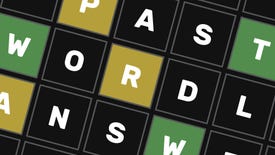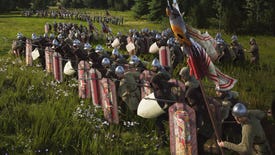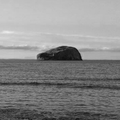-

Review: Another Crab's Treasure review: a playful Soulslike for everyone, especially if you like crabs
This will more than tide you over
-

Review: Sand Land review: a boring Mad Max lite that should have been very exciting
More like Bland Land, am I right?
-

Latest Horizon Forbidden West PC patch finally fixes its weirdest issue
Nvidia Reflex, you’ve bested me for the last time
-

The original Fallout is the perfect antidote to Fallout fever
War did change, actually
-

The kissable frogs and sparky combat of Hades 2 looks set to bewitch fans
Impressions of the "technical test"
-

Whatever the Fallout TV show does with New Vegas lore, Josh Sawyer doesn’t care: “It was never mine”
The Obsidian design director on Pillars of Eternity II burnout and living with dead projects
-
Lethal Company gets worse as you get better
Why being dumb is good, actually
-
The Maw - 22nd-27th April 2024
This week's least outwardly offputting game releases, plus our weekly newsblog
Live -
Should You Bother With... Hall effect keyboards?
Heroes of might and magnets
Psst! Explore our new "For you" section and get personalised recommendations about what to read.
-

£25 for a pair of speakers sounds great to us
These Creative Pebble V3 speakers are a great choice for rich, clear audio on a budget.
-

Get the fastest PCIe 4.0 SSD for $139 at Amazon
Save over $50 on the Crucial T500.
-

You can get a WD Black SN850X 2TB SSD for as little as £112 but they're selling fast
Save up to £28 on this speedy SSD using the eBay app and a special discount code.
-

The Crucial P3 2TB, one of the fastest 3.0 SSDs, is on sale for just £85
Get a big chunk of storage space for a bargain price.
-

Manor Lords too realistic or grimy for you? Try cosy survival townbuilder Diluvian Winds, out today
Spiritfarer with less grief
-

After ten years, Korean MMO ArcheAge is closing its European and North American servers
They'll shut down in June
-

Bulletstorm and Outriders studio have cancelled development on a co-op action RPG
Project Dagger was originally due to be published by Take-Two
-

Blizzard say the timing "doesn't line up"
-

Dr Robotnik's Ring Racers is a gorgeous free SNES-style arcade racer, built using Doom Legacy
Update: SNES stands for Saturn eNtertainment Electronic System, actually
-

In new open world game Lost Legions you are a Roman "rebuilding the empire" behind enemy lines
It starts with you conquering the trees
-
Gorgeous interactive fiction Pine: A Story Of Loss is a small sad game about a big sad man
Chopping wood, cutting onions
-
Fallout 4's "next gen" update is out today and might break your mods - here's how to stop it
Avert the dreaded autoupdate
-
SUDDEN DEATH is a free slice of interactive fiction about love, drugs, and Australian football
some of it is also about chips
-

Supporters only: Lethal Company is as much about protecting the mundane, as it is a horror game
They should put my new coffee grinder in there
I think the stronger your interest in white goods becomes, that's how you know you're transitioning from a youngster to a slightly oldster. The first thing I did recently when I stepped into my friend's house was compliment him on his new washing machine. "A Samsung! Nice dials on this, eh?", I said as I twisted the dial and it pleasantly bumped from mixed to …
-

Supporters only: Watching Civil War made me want more games with black and white stances on morality
I can't think of any good modern examples!
-
Supporters only: Piecing It Together gave me a timely little island of calm
Good thing I got my pieces
-
Supporters only: What are ‘solvable’ games, and is being solvable a bad thing?
Balatroptimisation
Get your first month for £1 (normally £3.99) when you buy a Standard Rock Paper Shotgun subscription. Enjoy ad-free browsing, our monthly letter from the editor, and discounts on RPS merch. Your support helps us create more great writing about PC games.
See more information-

Review: Another Crab's Treasure review: a playful Soulslike for everyone, especially if you like crabs
This will more than tide you over
-

Review: Sand Land review: a boring Mad Max lite that should have been very exciting
More like Bland Land, am I right?
-

Review: Tales Of Kenzera: Zau review: a beautifully designed yet imprecise platforming adventure
It's not time to make a change
-

The best farming games like Stardew Valley on PC
The cream of the crop
-

A very puzzling collection
-

The 15 best open world games on PC
Keep your options open
-

Review: Botany Manor review: peaceful and beautiful best-in-show plant puzzles
Come away, O human child! To the waters and the wild
-

The best microSD cards for the Steam Deck
Expand your Steam Deck’s storage with these tried-and-tested cards
-

Should You Bother With... Hall effect keyboards?
Heroes of might and magnets
-

Arise now, ye Cerim: No Rest for the Wicked’s performance updates are underway
Already running better on low-end GPUs
-

No Rest for the Wicked’s PC performance suggests the wicked might be better off waiting
Got them early access growing pains
-

Gorgeous interactive fiction Pine: A Story Of Loss is a small sad game about a big sad man
Chopping wood, cutting onions
-

SUDDEN DEATH is a free slice of interactive fiction about love, drugs, and Australian football
some of it is also about chips
-

Manor Lords too realistic or grimy for you? Try cosy survival townbuilder Diluvian Winds, out today
Spiritfarer with less grief
-

After ten years, Korean MMO ArcheAge is closing its European and North American servers
They'll shut down in June
-

Bulletstorm and Outriders studio have cancelled development on a co-op action RPG
Project Dagger was originally due to be published by Take-Two
-

Blizzard say the timing "doesn't line up"
-

Dr Robotnik's Ring Racers is a gorgeous free SNES-style arcade racer, built using Doom Legacy
Update: SNES stands for Saturn eNtertainment Electronic System, actually
-

What have we got in our digital pocketses
-
In new open world game Lost Legions you are a Roman "rebuilding the empire" behind enemy lines
It starts with you conquering the trees
-
Supporters only: Lethal Company is as much about protecting the mundane, as it is a horror game
They should put my new coffee grinder in there
-
The best microSD cards for the Steam Deck
Expand your Steam Deck’s storage with these tried-and-tested cards
-
Gorgeous interactive fiction Pine: A Story Of Loss is a small sad game about a big sad man
Chopping wood, cutting onions
-

Genshin Impact codes [April 2024]
All the currently active Genshin Impact codes on offer
-

Here's an archive of previous Wordle words
-

Today's NYT Connections hint and answers (Fri, Apr 26)
Need a hint for today's Connections? Read our guide for help with Connections #320
-

Wordle hint and answer today #1042 (April 26 2024)
Stuck on today's Wordle word for April 26? Read our hint or find the answer below!
-

This week's GTA Online Podium Car
Find out which car is the podium prize this week
-

Find out when Manor Lords releases in your region!
-
NYT Connections hint and answers (Thu, Apr 25)
Need a hint for today's Connections? Read our guide for help with Connections #319
-
Wordle hint and answer today #1041 (April 25 2024)
Stuck on today's Wordle word for April 25? Read our hint or find the answer below!
-
Fallout 4: Best Power Armor and where to find
Here are the best Power Armor sets in Fallout 4 and where to find them
-
NYT Connections hint and answers (Wed, Apr 24)
Need a hint for Connections? Read our guide for help with Connections #318











